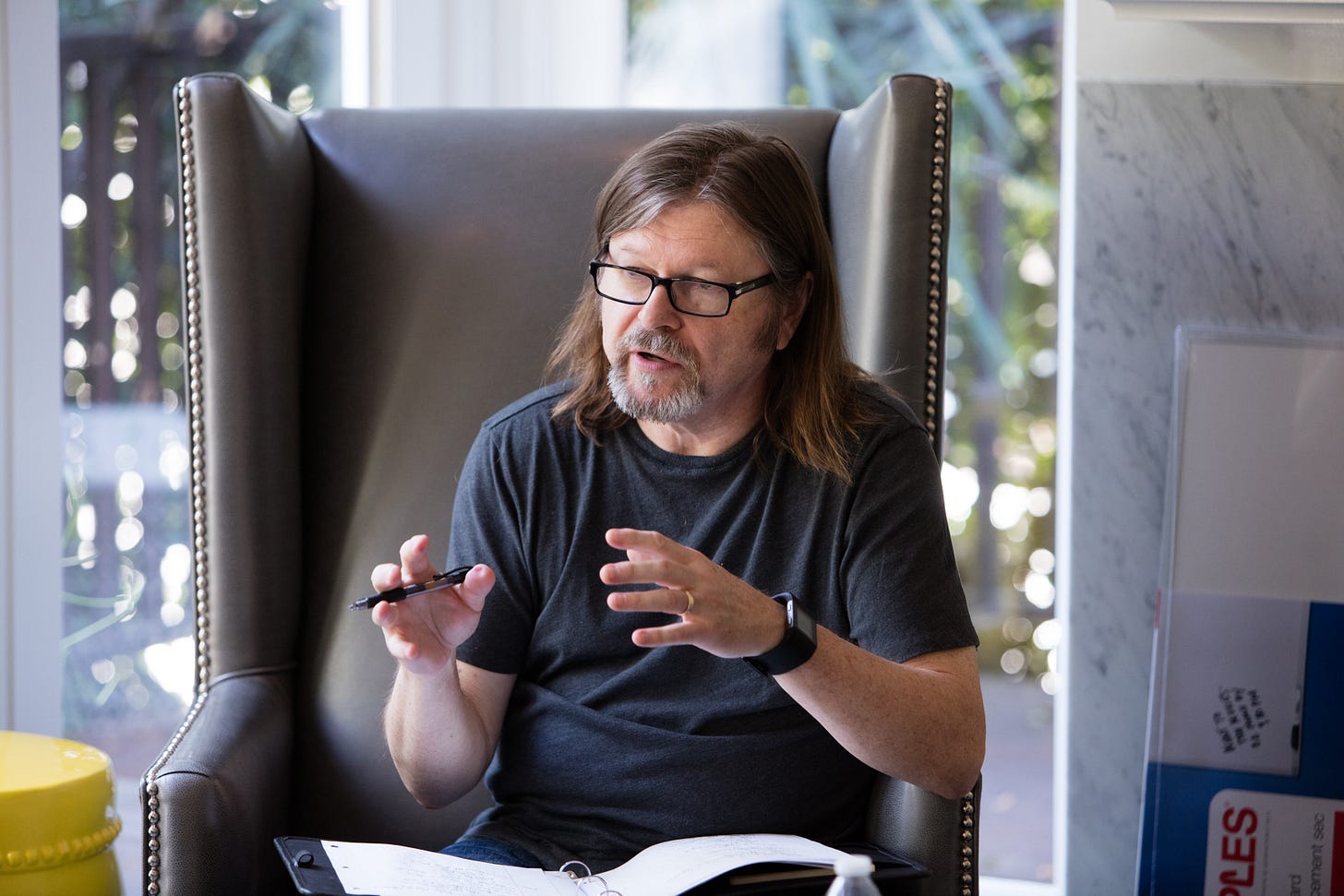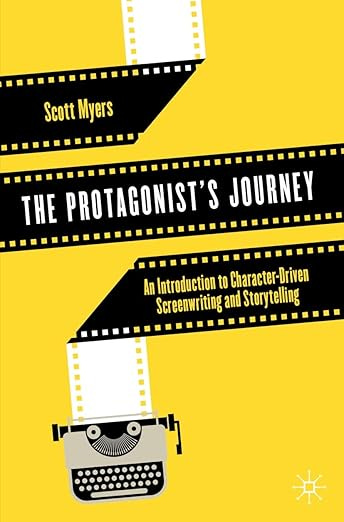Screenwriting Tips and Advice from Scott 'Go Into The Story' Myers
The man behind 'Go into the Story', a screenwriting guru, storytelling legend, and all round good guy.
If you’ve so much as dipped your toes into writing a screenplay, chances are you have landed upon Scott Myers’ incredible resource, ‘Go Into The Story,’ an iconic website full of writing advice, script analysis, and personal wisdom from Scott himself.
Scott is an expert at demystifying writing and doing it in an encouraging, supportive way. To talk to him, is to be inspired.
We've been in touch in various ways over the years, it's great to finally do an interview with you. How've you been?
Honestly, quite busy, but in a good way. I teach full-time as an associate professor of screenwriting at the DePaul University film school in Chicago. I also teach through my online educational resource ScreenwritingMasterClass.com. Based on the success of my book The Protagonist's Journey: An Introduction to Character-Driven Screenwriting and Storytelling, which was published in 2022, I've been invited to give presentations, lead seminars, and mentor writers in a variety of labs in England, France, Spain, Switzerland, Germany and Greece. Also, I've worked as a story consultant with a production company in Montreal called La Fête Films including their upcoming movie Mlle Bottine. Plus, I continue to write, currently revising an historical drama feature film script. And oh yeah ... there's my blog Go Into The Story, the official screenwriting blog of the Black List. So, lots going on. Fortunately, I love what I do.
You've been writing 'Go into the Story' for sixteen years. What made you originally start the site? What were your expectations back then?
There were several reasons, but the short answer is I had a vision of creating a free online resource for screenwriters. Over the years, I've written thousands of articles and they're all available in the blog archives, covering just about every conceivable subject related to the writing craft, so I feel like I achieved that original goal.
The film industry has changed so much since you started out. With streaming, and short online content, there are so many things for writers to potentially work on. Movies don't necessarily drive the culture in the same way, or as often, as they previously did. What role do you think the screenplay has in the modern era?
To me, there is no better way to tell a story than movies. A film hits all our senses: sight, sound, soul. We live vicariously through the characters, especially the Protagonist, allowing us to immerse ourselves in the unfolding story and that all begins with the screenplay. So, despite all the changes in the filmmaking business, the script is still where every project starts.
Who are the screenwriters working today who inspire you the most?
There are so many and I'm reluctant to provide specific names as I wouldn't want to omit anyone. So, let me answer the question this way: I admire anyone who writes a screenplay. If someone is passionate to write a story and actually commits to doing that, two thumbs up from me.
What part of writing do you struggle with the most?
The project I struggled with the most was The Protagonist's Journey. That type of writing is so different from writing a screenplay. With the latter, you sit down, get the characters in mind, put your fingers on the keyboard, and type feeling your way into and through the scene. With TPJ, I not only had to organize all the material (the book references over 300 movies and TV series), I also slaved over every single sentence because I strove to make it an enjoyable read. After I finished my research, the process of writing the book took twenty-one months (it's over 100,000 words), much of it during the height of the Covid pandemic. There were many mornings when I'd head down to my home office where I'd say to myself, "I'm never going to finish this project." But I kept writing, day after day. And then, it was done.
I swore I'd never write another book again, but I must have a short memory because I've got one in the works: The Theology of Cinema: Religious Themes in Secular Movies.
So many writers are desperate to write, but they're waiting for the 'right idea'. What do you do when that idea isn't coming?
That's a tricky question because on the one hand, you do want to take on a project with a strong story concept. On the other hand, you can't let the pursuit of such a good story idea stymie you from writing anything. This is why I advocate this practice to my students: Create a story concept list and keep adding to it. There have been times as a screenwriter where I would generate one story concept per day. Nobel Prize winning scientist Linus Pauling said, "The best way to have a good idea is to have lots of ideas." That's a good philosophy.
Your blog has gone through many iterations over the years. Partnering with The Black List, and now you use Medium. The distribution of writing online is changing as much as any other form. Tell me a little about how you've navigated the online world, and what are your thoughts on sites like Medium and Substack?
My switch to Medium in 2016 made things a lot easier for me. Before, I used WordPress and had to master a bunch of HTML codes. It was a real pain. Medium makes it easy. I know quite a few writers who use Substack. That doesn't work for what I do with Go Into The Story where I keep adding to the archives. That said, I'm going to launch a Go Into The Story Patreon site in 2025 where I plan on posting more long-form articles and reflections on the craft, something I've drifted away from on my blog.
Sometimes, with modern movies, I feel like the 'message' of the film feels too loud, and overshadows the story. Politics and social values have been a part of storytelling since the beginning of time, but how do you advise writers to do this in a way that tells a good story?
There's that old Hollywood saying directed toward screenwriters: "If you want to send a message, use Western Union" (i.e., a telegram). To me, the focus should be on the characters. Some years ago, I came up with an alliterative definition of Story: "A character we care about confronts complex challenges created by a compelling crisis with a cathartic conclusion." The best way to avoid creating a "message heavy" movie is to focus on the specific, personal journey of the Protagonist through the events they experience and the relationships they forge with the characters they interact with along the way.
What are a couple of movies you've seen in the last five years that for you, from a writing point of view, hold up with your favourite films from decades ago?
There have been so many remarkable movies in the past five years. Just last year, I loved Past Lives, The Zone of Interest, Anatomy of a Fall, Fremont, The Holdovers, Poor Things, and then, of course, Barbie and Oppenheimer.
Last question, nice simple one. Tell me something about screenwriting that you've never told anyone.
That's a tough one because now that I'm also a teacher, my job is to share everything I know with my students. I'll go with this: "Don't be afraid to cry when you write." Whether because a scene you've been writing is terribly sad ... or it works so well, you're overwhelmed with emotion ... or the exhilaration you experience when you type Fade Out ... whatever the circumstance, if you feel like crying, then let the tears flow. Because one of our primary goals as screenwriters should be to elicit emotion in the reader. If we feel something deeply when writing the story, that emotion is likely to transmit from your pages into the heart and soul of the reader.





I was just writing about the differences in approaches, generally speaking, between Pantsing short fiction writers and Planning screenwriters, so it's interesting for me to read this: With [screenwriting], you sit down, get the characters in mind, put your fingers on the keyboard, and type feeling your way into and through the scene.
It sounds like Scott takes quite a different approach to a lot of other screenwriting gurus I've read? How important is planning, and mapping out a structure, to his approach?